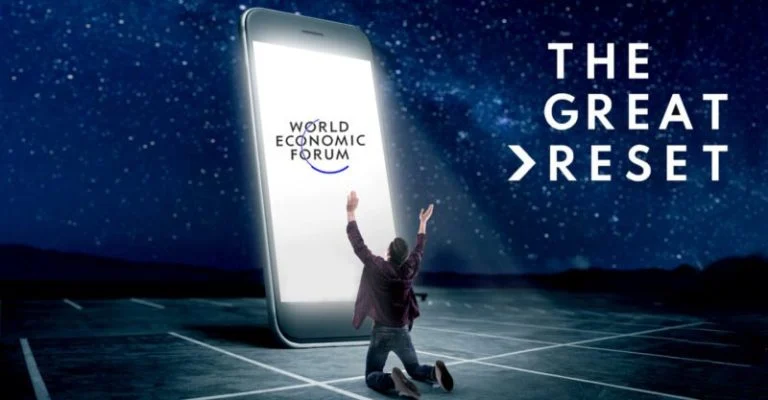World Economic Forum’s Great Reset: The Great Dispossession. The Loss of Property Rights in Financial Assets. “Own Nothing Be Happy”
GREAT RESET, 15 Apr 2024
Paul Craig Roberts | Global Research – TRANSCEND Media Service
11 Apr 2024 – Klaus Schwab tells us that in the Great Reset that the World Economic Forum is preparing for us “you will own nothing and you will be happy.”
Well, we already own nothing. Our bank deposits and stocks and bonds, in the event the depository institution gets into trouble, belong to the depository institution’s creditors, not to us.
All assets are pooled and serve as collateral whether or not labeled “segregated.”
 You might remember that during the last financial crisis we were told that there would be no more bail-outs, that in the future there would be bail-ins. A bail-out is when central bank money creation rescues the favored troubled financial institutions.
You might remember that during the last financial crisis we were told that there would be no more bail-outs, that in the future there would be bail-ins. A bail-out is when central bank money creation rescues the favored troubled financial institutions.
A bail-in is when the depositors’ assets are used for the rescues.
David Rogers Webb, an experienced financial market participant, explains it in The Great Taking in 72 readable pages plus a 25 page prologue explaining who he is and a 20 page reply of the New York Fed to the European Commission Legal Certainty Group’s questions. The Great Taking is available from Lulu for $10 and is free online.
The loss of property rights in financial assets is the case throughout the Western world.
The rewrite of financial property rights appears to be the work of regulatory bodies, not legislatures which seem to be unaware of it.
No, it is not a conspiracy theory. Regulatory authorities have made legal changes of which financial market participants are unaware. Webb’s purpose is to bring awareness, which is why he has made his book freely available.
As a result of these changes, which appear to have been made by financial regulatory authorities rather than by elected legislatures, individuals no longer have property rights in “their” securities.
“Owners” now have “entitlement rights,” which means that they have pro-rata rights to whatever securities remain in the depository institution after secured creditors’ claims are met.
In actual fact, “your” securities and your bank deposits are no longer recognized in law as your personal property if the depository institution–the bank or, for example, Merrill Lynch–becomes financially troubled.
Your “ownership” is encumbered as collateral for secured creditors who are the owners in fact. Apparently, this was done by regulatory authorities as underpinning for the derivatives complex, which is many magnitudes greater than world GNP, or perhaps derivative exposure served as an excuse for setting up the Great Reset in which “you will own nothing.” Indeed, individual banks among the world’s largest have derivative exposure the size of world GDP.
You might wonder why regulatory authorities permitted something so dangerous and irresponsible to occur.
To state the bottom line in another way, “your” securities serve as collateral for the creditors of depository institutions.
Your right to “your” property terminates the minute the depository institution gets in financial trouble.
Communications between the New York Federal Reserve Bank and the European Commission Legal Certainty Group and the court case resulting from the failure of Lehman Brothers have established legal certainty that secured creditors are empowered to immediately take client assets in the event of a failure in the custodian.
National central depositories of securities (all are now pooled, none held under the “owner’s” name or segregated) are now established and are linked to the international depository so that securities can instantly be delivered world wide to meet secured creditors’ claims. Essentially, the mega-banks are “privileged creditors.”
You might think that your money and your stocks and bonds would be safe if you use as your depository one of the “banks too big to fail.” You would be mistaken. The Federal Reserve permits the large banks to create subsidiaries that hold deposits, and the Federal Reserve permits the large banks to transfer their derivatives to these same subsidiaries. In this way, the bank itself remains afloat. Only its subsidiaries holding your money and securities are wiped out in the event of a crash.
At the risk of over-promising, as even for a person of my education and experience getting one’s mind around the enormity of what has been put in place is a challenge,
I hope for this article, which you have just read, to be part 1 in a 3-part series, with the second part being an outline of the regulatory changes that stole our financial property rights, and the third part being the implications of the Federal Reserve’s raising of interest rates after 15 years of near zero rates, thus shredding the value of financial assets held in portfolios. We face the prospect of the worst financial crisis in history “solved” with the introduction of digital money that places total control into the hands of political power and its masters.
___________________________________________
 Dr. Paul Craig Roberts has had careers in scholarship and academia, journalism, public service, and business. He is chairman of The Institute for Political Economy, was Assistant Secretary of the Treasury for Economic Policy (1975-78) under Pres. Reagan, and associate editor of the Wall Street Journal. He was columnist for Business Week, Scripps Howard News Service, and Creators Syndicate. He has had many university appointments. Roberts’ latest books are The Failure of Laissez Faire Capitalism and Economic Dissolution of the West and How America Was Lost.
Dr. Paul Craig Roberts has had careers in scholarship and academia, journalism, public service, and business. He is chairman of The Institute for Political Economy, was Assistant Secretary of the Treasury for Economic Policy (1975-78) under Pres. Reagan, and associate editor of the Wall Street Journal. He was columnist for Business Week, Scripps Howard News Service, and Creators Syndicate. He has had many university appointments. Roberts’ latest books are The Failure of Laissez Faire Capitalism and Economic Dissolution of the West and How America Was Lost.
Go to Original – globalresearch.ca
Tags: Bilderberg Group, Capitalism, Economics, Elites, Great Reset, Mafia, Organized crime, The Rothschild family, World Economic Forum
DISCLAIMER: The statements, views and opinions expressed in pieces republished here are solely those of the authors and do not necessarily represent those of TMS. In accordance with title 17 U.S.C. section 107, this material is distributed without profit to those who have expressed a prior interest in receiving the included information for research and educational purposes. TMS has no affiliation whatsoever with the originator of this article nor is TMS endorsed or sponsored by the originator. “GO TO ORIGINAL” links are provided as a convenience to our readers and allow for verification of authenticity. However, as originating pages are often updated by their originating host sites, the versions posted may not match the versions our readers view when clicking the “GO TO ORIGINAL” links. This site contains copyrighted material the use of which has not always been specifically authorized by the copyright owner. We are making such material available in our efforts to advance understanding of environmental, political, human rights, economic, democracy, scientific, and social justice issues, etc. We believe this constitutes a ‘fair use’ of any such copyrighted material as provided for in section 107 of the US Copyright Law. In accordance with Title 17 U.S.C. Section 107, the material on this site is distributed without profit to those who have expressed a prior interest in receiving the included information for research and educational purposes. For more information go to: http://www.law.cornell.edu/uscode/17/107.shtml. If you wish to use copyrighted material from this site for purposes of your own that go beyond ‘fair use’, you must obtain permission from the copyright owner.
